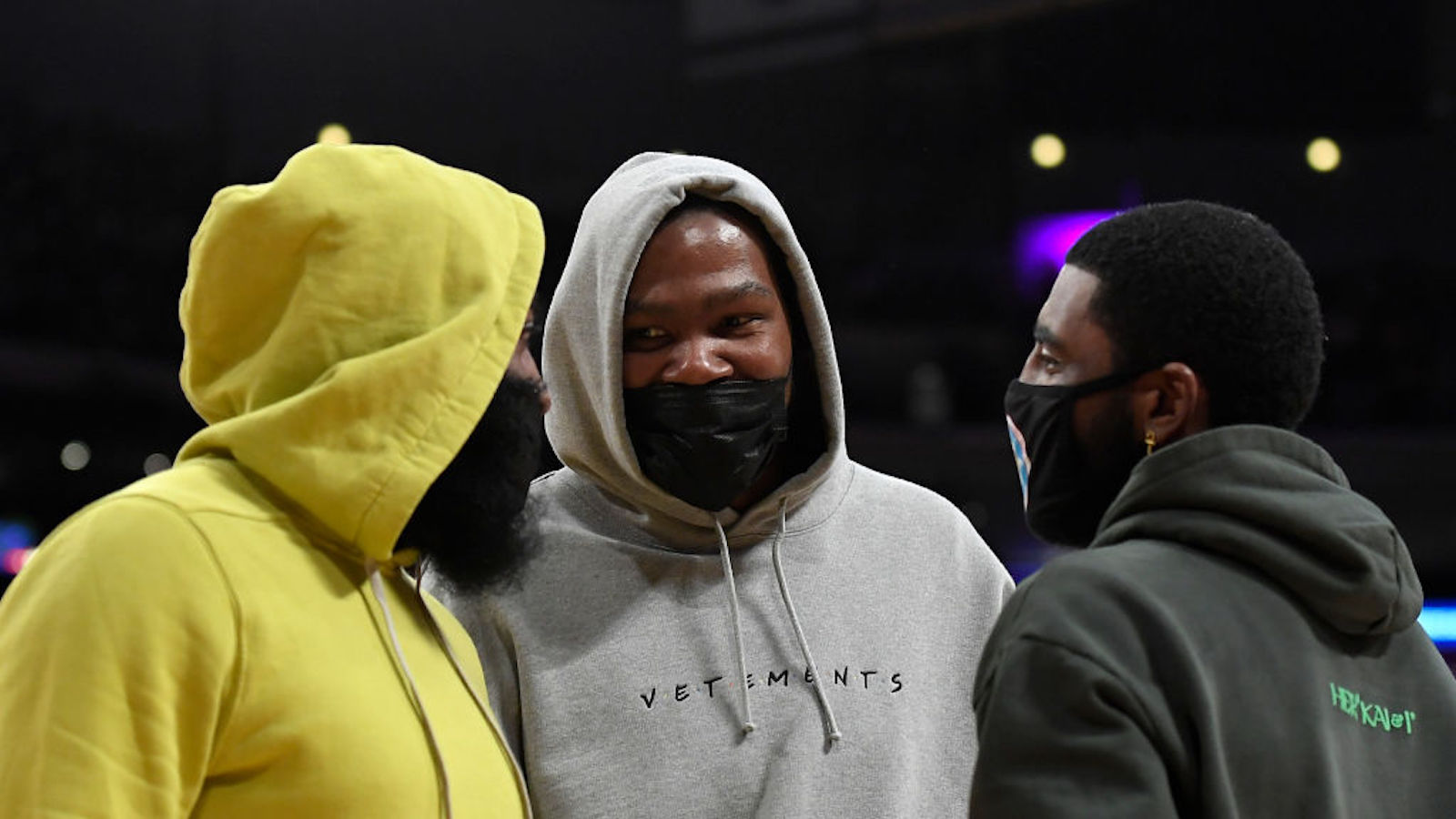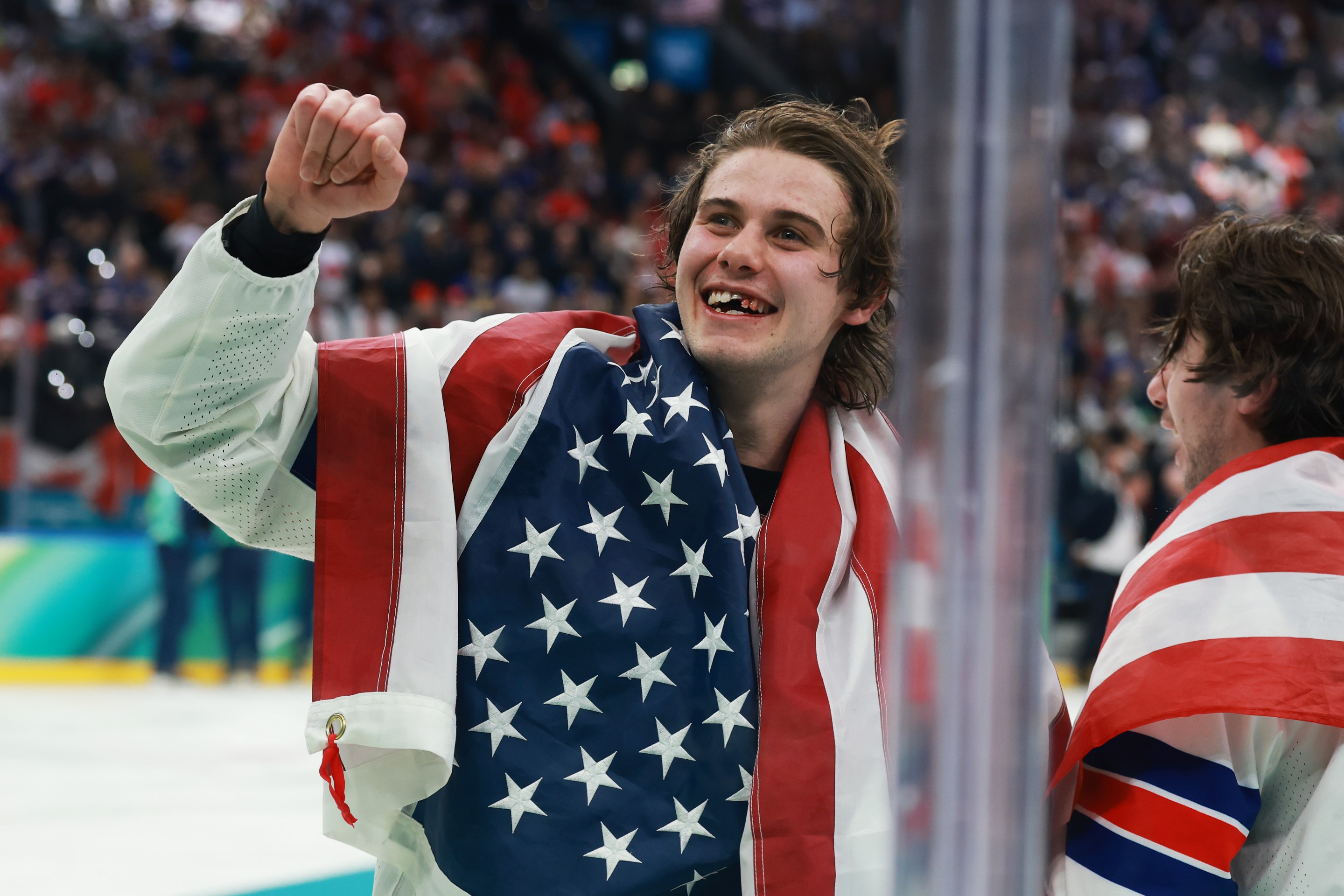Once upon a time, Joe Tsai loved basketball so much that he decided to obtain a sizable and splashy chunk of it. On successive days in 2019, he obtained the services of first Kyrie Irving and then Kevin Durant as part of a plan to make the Brooklyn Nets the biggest team in New York. It seemed like a glorious idea, given that he was in the final stages of winning total operational control of the team and its arena from Russian Mikhail Prokhorov, and the best way to be loved by sports fans is to buy them things can enjoy and learn to cherish.
Thirteen-hundred thirteen days later, he has found that the only thing that beats that initial burst of acquisition is rage-fueled divestiture, which he completed last night by sending Durant and the quietly useful T.J. Warren to the Phoenix Suns, two days after trading Irving to Dallas and being called petty by Draymond Green for doing so. The grandly combustible Brooklyn Project (h/t Manhattan Project) is over, and it has been by any standard the most symmetrically grandiose failure in the history of roster construction.
In any sport.
Ever.
Durant goes to the Suns and their hours-old franchise operator, Mat Ishbia, for a package of players and draft picks that include Not Devin Booker, Not Chris Paul and Not DeAndre Ayton. Yeah, that's how pissed Tsai was about his 43-month dalliance with genius, petulance and madness—he declined commensurate value for Durant because he had been where Ishbia is today, infatuated with his new company and the joy of notice-me acquisitivess.
And we say symmetrical because Tsai dealt for the Irving's services and then Durant's on successive days back in July 2019, but needed an extra day after Irving's exile on Monday to excise Durant. His decisions and their implementations were made easier by the fact that he didn't send both the mercurial Durant and the Neptunian Irving to the same team. Only one monumental idiot would do something that momentarily exhiliarating and eventually daft, and Tsai couldn't very well trade them to himself.
So he found Mark Cuban, frustrated by the reality that Luka Doncic alone would age out poorly even though he is only 23, and then he found Ishbia, whose first act after touring the Suns merchandise store was to change its inventory. Ishbia had just been approved as the Suns' new owner on Tuesday replacing the aggressively unpleasant wind chime Bob Sarver, with the approval of every owner except Cleveland's Dan Gilbert, who is a business rival. So Ishbia decided to make friends by doing Gilbert the solid of helping gut the team next to the Cavaliers in the Eastern Conference standings. One tentacle washes the other, after all.
And while we are loath to declare the Irving or Durant trades potential steals for the Mavericks or Suns because we'd be using the same hyperbolic phrases we all used four years when they both went to Brooklyn, we definitely know what the trades mean for the Nets, because it's going to take a long time for them to overcome the angry self-pitying of their owner.
That is, unless Tsai decides instead to ignore the Nets entirely as punishment for the migraines they caused him, and instead lavish his attention upon his New York Liberty, which just performed the equivalent of the Irving-Durant deals of four years ago with Breanna Stewart and Courtney Vandersloot. Those two deals, which are designed to upset the world order of the WNBA the way Irving and Durant were supposed to do with the gentlemen's league, show that Tsai isn't opposed to owning super teams as a concept. He is betting that neither Stewart nor Vandersloot can even approach an erg of the frustrations Irving and to a significantly lesser extent Durant bestowed upon him, a feat as yet unimaginable by anyone without a background in science fiction writing.
As basketball matters, bringing Irving to Dallas is a gamble Cuban took because he saw no happy resolution to a team with Doncic and ancillary parts that didn't end in early playoff outs, even though they miraculously reached the Western Conference final a year ago when Phoenix blew itself up in part over Ayton's addiction to video games.
In Phoenix, Ishbia is getting the more basketball-driven Durant and his battered 35-year-old body as a roll-the-dice-now move to get the Suns the parade they thought they'd earned last season, and keeping their three most impactful players while undercutting the supporting players and their drafts until the end of the decade is just the price of dabbling in the instant gratification game.
Barring Brooklynesque catastrophies in both cities, the Mavs and Suns have helped unclog the bloated middle of the conference as part of a tsunami of moves that have made this the most spectacular trade deadline since, well, err, uhh ... yeah. Since then.
Minnesota took on the aging superstructure of Mike Conley and decoupled from D'Angelo Russell as part of a three-team deal that made the Los Angeles Lakers better both by addition and subtraction. Utah acquired Russell Westbrook so they could unacquire him. Los Angeles got Russell, moved Westbrook, and acquired Jarred Vanderbilt as a bonus prize for shopping. Sacramento tweaked its beamage with two-year-old Kessler Edwards, who is also escaping the wreckage of the USS Net. Portland just shipped Josh Hart to New York in a trade that, well, happened is probably the most effusive verb we can attach here. And there could still be more by the 3:00 p.m. (ET) deadline, because Golden State owner Joe Lacob probably thinks he can get Giannis Antetokounmpo for James Wiseman.
All these moves essentially eradicated LeBron James's big night from the headlines, which is its own blessing given that nobody could offer any insight more thought-provoking than "He's amazing," which I think everyone has known going back to the days of Aristotle and Seneca. But they also proved more than ever that the NBA is actually at its best not when it plays games but in the spaces between them, when the real national pastimes of money roasts and Roster Scattergories are at their height.
Mostly, though, this is a story of owners. For Ishbia, it is in the cry for immediate action that handing over billions to a bastard cannot sufficiently fulfill. For Cuban, it is in addressing the annoyance of competitive stasis around a brilliant young player with the eternal threat of turbo-instability. And for Tsai, it is in the knowledge that the definition of insanity has his picture in the inset, and that it took him 43 months to see it. He will never ever EVER invest hundreds of millions trying to build a super team again under any circumstances.
Except for the Liberty. In fairness to Joe, quitting cold turkey is hard.






